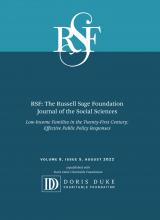Abstract
Against the backdrop of dramatic changes in work and family life, this article draws on survey data from 2,971 mothers working in the service sector to examine how unpredictable schedules are associated with three dimensions of parenting: difficulty arranging childcare, work-life conflict, and parenting stress. Results demonstrate that on-call shifts, shift timing changes, work hour volatility, and short advance notice of work schedules are positively associated with difficulty arranging childcare and work-life conflict. Mothers working these schedules are more likely to miss work. We consider how family structure and race moderate the relationship between schedule instability and these dimensions of parenting. Unstable work schedules, we argue, have important consequences for mothers working in the service industry.
- © 2022 Russell Sage Foundation. Luhr, Sigrid, Daniel Schneider, and Kristen Harknett. “Parenting Without Predictability: Precarious Schedules, Parental Strain, and Work-Life Conflict.” RSF: The Russell Sage Foundation Journal of the Social Sciences 8(5): 24–44. DOI: 10.7758/RSF.2022.8.5.02. We gratefully acknowledge grant support from the Russell Sage Foundation (Award No. 77–18–05), the W. T. Grant Foundation, the National Institutes of Child Health and Human Development (R21HD091578), the Robert Wood Johnson Foundation (Award No. 74528), and the Bill & Melinda Gates Foundation (Award No. 002665). Direct correspondence to: Sigrid Luhr, at sluhr2{at}uic.edu, 4112 Behavioral Sciences Bldg, 1007 W Harrison St, Chicago, IL 60607, United States.
Open Access Policy: RSF: The Russell Sage Foundation Journal of the Social Sciences is an open access journal. This article is published under a Creative Commons Attribution-NonCommercial-NoDerivs 3.0 Unported License.






